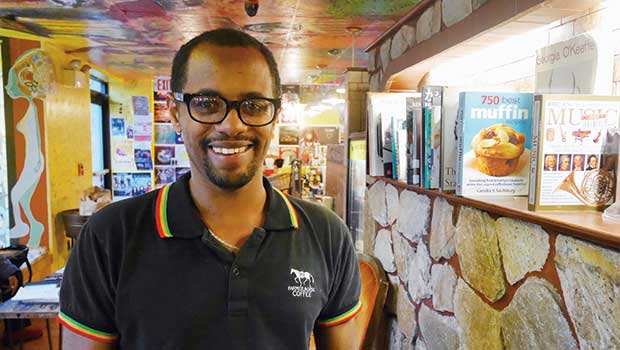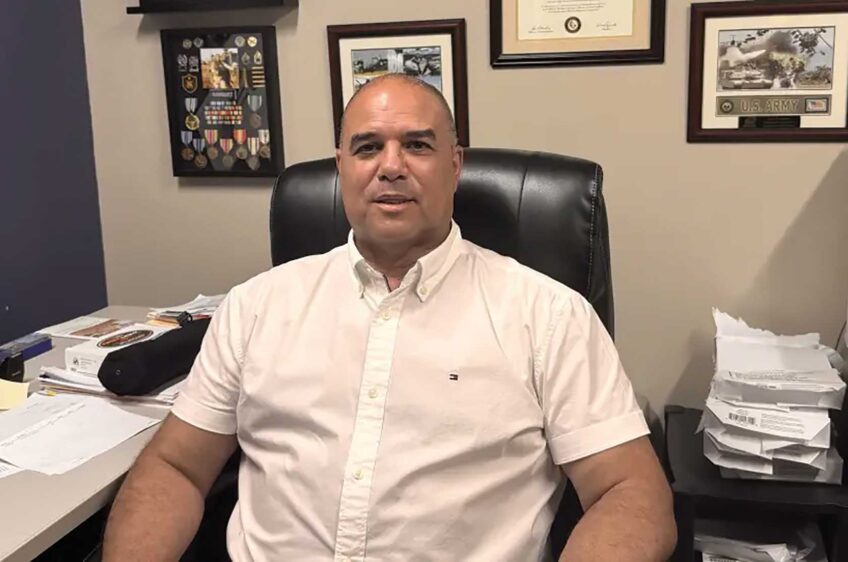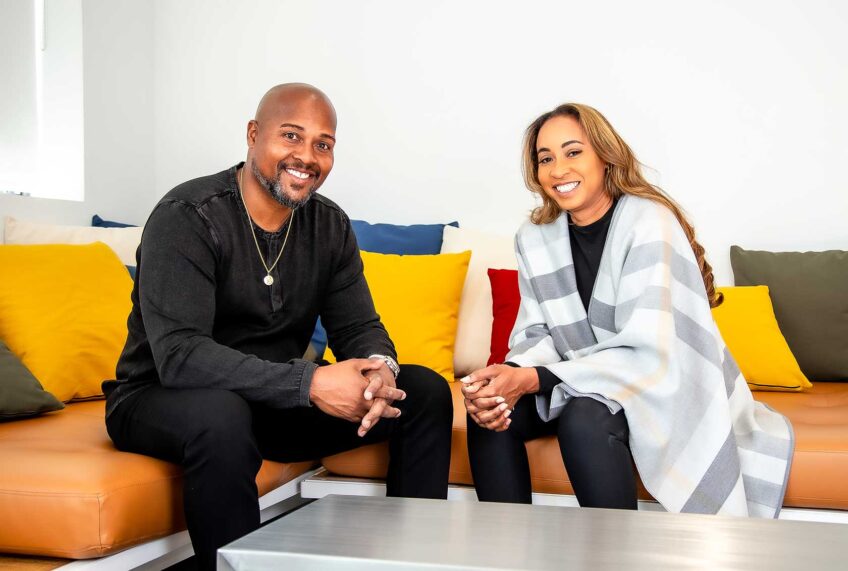Brew with a purpose
Entrepreneur harnesses coffee to help Ethiopian farmers

“The only thing I know is coffee,” says Kassegn Sirmollo, owner of Farmer’s Horse Coffee, where the brew is made with beans grown in his native Ethiopia.
Sirmollo grew up on a southern Ethiopian farm. As a child, at harvest time he loved to sample the coffee trees’ sugar-sweet red “cherry beans” before the green coffee beans were extracted, dried and sorted in preparation for roasting.
His family roasted beans at home, he says. Serving coffee to visitors was an important ritual, with his mother presiding and the children helping.

Author: Sandra LarsonSirmollo says he has painted his coffee shop three or four times in order to create a welcoming ambience.

Author: Sandra LarsonPastries and bagel-and-egg sandwiches are offered along with Ethiopian coffee.
If you go
What: Farmer’s Horse Coffee
Where: 374 Massachusetts Ave., Boston
Hours: Open daily 6:30 a.m. to 8 p.m.
Phone: (617 ) 982-7183
On the Web: http://farmerhorse.com
“If you were a guest in my house, the first thing my mom would do is prepare the ceremony of coffee,” he explains, speaking over the bustle of conversation and music in the cafe on a recent afternoon. “Every kid who grows up in Ethiopia does one of these things to help — you roast, or you grind, or wash the beans, or serve coffee to the guests.”
With Farmer’s Horse, he aims to share Ethiopian coffee and to offer a welcoming vibe for his customers, many of whom are students and faculty at nearby New England Conservatory and Northeastern University or T riders who get on and off at the Mass Ave Station of the Orange Line.
The coffee Farmer’s Horse serves includes Ethiopian regional origins such as Sidamo, Harrar, Limu and Yirgacheffe. The streaming music in the vividly-hued cafe reflects Sirmollo’s preference for oldies — heavy on Motown, blues and R&B — but interspersed with Ethiopian music and, recently, Christmas selections.
Each morning, he or one of his two part-time employees serve up a steady stream of coffee and espresso drinks along with baked goods and bagel-and-egg sandwiches. As the day goes on, lunch specialties include a sweet potato and tomato sandwich with goat cheese, red onion, avocado and spinach. On weekends and evenings, the cafe, which seats 20 to 25 people, is often filled to capacity with students studying and tables of friends chatting or working on group projects.
Education — and a mission
In truth, Sirmollo, who turns 33 this month, knows a lot more than coffee. After arriving in the U.S. as a teenager with his family, he earned a bachelor’s degree in mechanical engineering and a master’s in applied mathematics, taught math for a time, and learned-by-doing while launching and growing his business. A self-described handyperson, he built out much of the cafe space himself, he says.
Between college and graduate school, Sirmollo needed a break and wanted to follow a yearning to somehow help Ethiopia, where rapid population growth has worsened problems from hunger to clean water shortages to lack of basics such as shoes. In 2011, he flew to California and proceeded to bicycle across the U.S. back to Boston. During the 63-day journey, he spoke to people everywhere to raise awareness of poverty in Ethiopia.
“There are things we take for granted here, but people in Ethiopia don’t have shoes,” he says.
Later, as he applied his education in teaching jobs, he continued to think about a larger mission.
“I taught in community college for a while and that was fun, but I wondered, ‘How do I help people back home?’ I wanted to have an impact on more than just a few people,” he says. “So that’s where the idea came to start a business or a venture that would create awareness and raise money, and build something.”
A portion of sales from every cup of coffee Farmer’s Horse sells goes toward aid to Ethiopian farmers in the form of building clean water wells. It takes $4,500 to $5,500 to dig a well that will serve 300 people, and his goal is to be able to provide two or three new wells a year.
Building a business
When he first thought about a coffee business, Sirmollo envisioned a mobile coffee truck, but he joined up with some partners, one of whom had secured the space at 374 Massachusetts Ave. They opened Farmer’s Horse in 2014, managing the startup costs with savings and a do-it-yourself approach. Today, he operates the business with his cousin, Abinet Kassa.
The doors opened at Farmer’s Horse (originally named “Farmer Horse”) without much publicity or fanfare. The primary marketing tactic was a chalkboard sign on the sidewalk out front, along with the coffee, food and welcome they could offer inside.
“It was a grassroots approach,” Sirmollo says. “I wanted to let people discover it, experience it and tell their friends.”
Over time, growth has come slowly but steadily, he says, and now they can count on the 120 to 150 customers they need each day to stay afloat.
The menu has seen some adjustments — for instance, the chai and ginger tea are house-made now instead of from concentrate and they began offering fruit and vegetable smoothies in August. The decor has been transformed several times, from an early “modern and sleek” look to the final rustic feel with customer-written graffiti decorating nearly every inch of the rich red, green and yellow painted walls.
“When something’s not working, I take it apart and try something else,” Sirmollo says. “I’ve painted this place three or four times. Now I like it, and other people like it. The goal for me was to create that ambience where people feel welcome, they can relax, they can do their work.”
Next steps
Sirmollo’s goals include being able to import, roast and sell beans himself rather than buying from a supplier and bringing the beans to a roaster in Medford, as he does now. He’s working on a new e-commerce website that will enable Farmer’s Horse to sell its coffee beans online. The packaging and labels are designed and ready, and a Kickstarter campaign will launch soon to raise funds toward buying the roaster. From the coffee bean sales, Sirmollo plans to donate 50 cents per pound toward clean water projects.
Reflecting on his path so far, he has no regrets.
“The best thing is to be able to do something you’re passionate about,” he says. “I get up at 5:30 every morning — that never happened when I was working for other companies! And I’m here until 10 p.m. And it’s fun.”
He adds, “I’ve made mistakes, but each time I learned from it. Regret comes only when you don’t go back and correct something. I’ve learned a lot of things in a short time. Now, everything I’ll do going forward will be less risky.”






